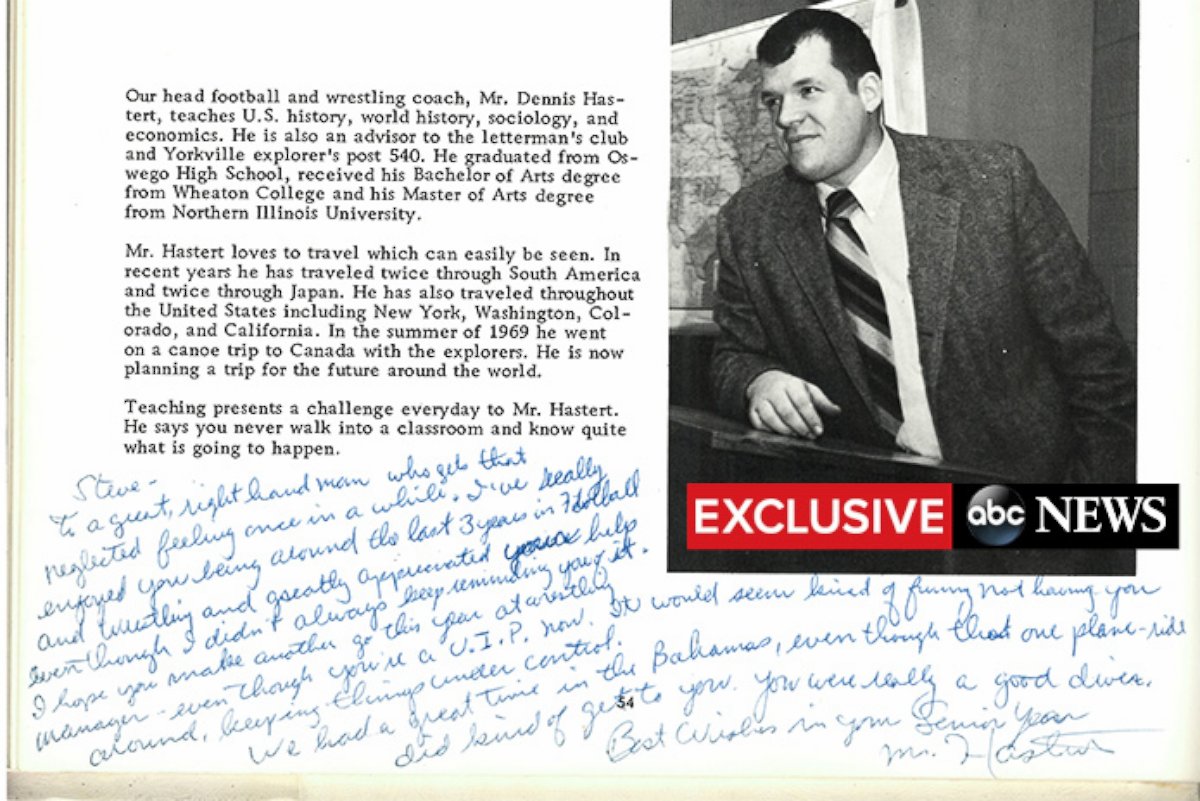'Got a Pass'? Dennis Hastert Case Renews Debate Over Sex Crime Statute of Limitations
Decades after alleged misconduct, Hastert likely to get little or no jail time.
— -- The nationwide debate over statutes of limitations on child sex crimes has been reignited in the wake of a plea deal that could give former Speaker of the House Dennis Hastert little to no jail time for a fraud charge linked to alleged decades-old sexual abuse of minors.
Hastert, 73, allegedly abused more than one student while he was a coach at Illinois’ Yorkville High School in the late 1960s and early 1970s, but was only brought to trial for a financial crime after attempting to hide recent hush money payments to one of his alleged victims. The maximum penalty for the financial crime for which Hastert was convicted is five years, but the plea deal includes a recommendation that he receive at most six months in prison. Hastert has declined to comment on the abuse allegations.
Jolene Burdge, the sister of one of Hastert’s alleged victims not involved in the hush money payments, told ABC News after the deal was filed Wednesday that she felt Hastert “got a pass.”
“I think he got a pass because of his power and status. I think he got a back room deal. His victims didn’t get a pass when he put them through the abuse,” she said.
Sex crime victims advocate Marci Hamilton told ABC News that Hastert was a “beneficiary of the short statute of limitations” on child sex crimes and those allowed him to “dodge a bullet.”
“Because the combination of a plea deal, [and] the fact that he evaded the sex abuse statutes of limitations. Those two together created this opportunity for him to be able to, essentially, get off,” said Hamilton, a professor at Cardozo School of Law.

Currently there is no statute of limitations for sex crimes against minors in Illinois, meaning prosecutors can take legal action against the alleged perpetrator at any time when physical evidence is available or if someone who should have reported the suspected abuse failed to -- but that wasn’t the case until the law was updated on Jan. 1, 2014, and it’s not retroactive.
If the crime occurred prior to that date, a previous statute of limitations comes into effect that said there was a 20-year window for prosecution beginning after the victim turns 18. The 20-year rule, which is on the longer side compared to most states' statutes, wasn’t taken up in Illinois until 2003, the latest in a series of extensions beginning in the mid-1980s -- all still long after Hastert’s alleged crimes supposedly took place. Hastert’s alleged victims were believed to be teenage boys more than four decades ago, meaning their window is almost certainly long closed. (A summary of the evolution in Illinois legal code written in part by a local state attorney doesn’t discuss crimes prior to 1984 because of the “unlikelihood” that they would still be prosecuted.)
Spencer Kuvin, a Florida attorney who has represented victims of sexual assault, said, “Unfortunately, it’s too often the case that by the time the victim gains the courage necessary to come forward, too much time has passed, and prosecution becomes impossible.”
Last November, as several women came forward to accuse comedian Bill Cosby of a string of decades-old sexual assaults, Eileen McNamara, a journalism professor at Brandeis University, argued that statutes of limitations on sex crimes should be abolished nationwide -- especially with the advances in DNA evidence.
“Why should a rape victim’s access to the courthouse depend on when the crime was committed?” McNamara wrote then. “There is no statute of limitations on murder because no one thinks the passage of time should shield a killer from answering for his crime. Why should perpetrators of the soul-killing act of rape have such a legal escape hatch?”
Gloria Allred, who represents more than two dozen of the Cosby accusers, told ABC News Wednesday that she has seen a “trend” in the U.S. in which state lawmakers are extending the statute of limitations for adult survivors of child sexual abuse – meaning victims have more time to make their accusations before the clock runs out.
“It often takes a long time, many years, even decades before an adult survivor even recognizes the injuries that they may have suffered are as a result of the child sexual abuse,” Allred said. Cosby has repeatedly denied the allegations against him.
But even if the statute of limitations could reach back far enough in Hastert’s case, critics, including veteran Chicago-area defense attorney Michael Ettinger, said the statutes would be unconstitutional, if they aren’t already.
“I personally find the long statute of limitations unconstitutional in that it violates equal protection of the law and due process law both found in the 14th Amendment,” Ettinger told ABC News, speaking of the 20-year rule. “No other crimes have that long of a statute except murder and there is absolutely no rational basis for 20 years after the victim turns 18.
“How does anyone defend themselves against an allegation of misconduct 20-plus years ago? Put an alibi defense together 20 years later? Statutes of limitations are enacted for that very reason,” he said.
An Illinois lawmaker expressed similar concerns just before the Illinois House voted in May 2013 to abolish the 20-year statute of limitations.
“All of us here, regardless of where we live or what party affiliation we are, think this is a deplorable thing that could happen and affect the minds of young children for years to come,” Republican state house Rep. David Reis said then. “But, having previously served on a judiciary committee, it was always that, what are we opening up here? If a criminal suit couldn’t be brought against someone before the statute of limitations expired, if the case is so cold... People grow up, emotions change, people move from different parts of the country. It was just that, would you be able to have a fair hearing?”
During a 2003 case, U.S. Supreme Court Justice Stephen Breyer lamented, “Memories fade, and witnesses can die or disappear. Such problems can plague child abuse cases, where recollection after so many years may be uncertain and 'recovered' memories faulty, but may nonetheless lead to prosecutions that destroy families.”
Ettinger and some other prominent legal ethics experts told ABC News Wednesday they felt the plea deal Hastert received was appropriate, given his age and the crime for which he was formally accused.
“If he was being charged for sexual misconduct, that’d be another thing,” Ettinger said.
Ettinger said he didn’t see any additional recourse for Hastert’s alleged victims, but a few legal wrinkles could mean Hastert is still technically vulnerable to legal action. For instance, the 20-year clock on the previous Illinois statute of limitations doesn’t begin to count down if the victim of the abuse is further “subject to threats, intimidation, manipulation, or fraud” by the perpetrator or someone else working on behalf of the perpetrator in the years following the abuse. Also, the 20-year legal code indicated action can be an option if new injuries from the abuse are “discovered” later -- perhaps as a repressed memory unearthed in the course of therapy.
For Burdge, however, seeing Hastert have to admit to wrongdoing in court this week was at least a bit of solace and closure, even if the world never knows the true extent of that wrongdoing.
“Now that your illegal and immoral actions have finally come to light, please let me ask you, Mr. Hastert, how does it feel to be at the mercy of someone else’s power?” she said. “Finally, after all this, I have to say that I forgive you. I have to do that for myself, more for myself than for you. You have taken enough time and enough heartache and enough away from myself and from my family. Breaking this connection with you, putting this to rest is the best gift and legacy that I can give Steve.”

ABC News’ Alexander Hosenball and Cho Park contributed to this report.




